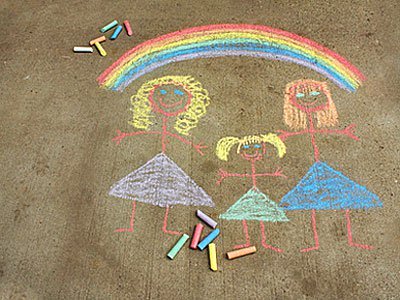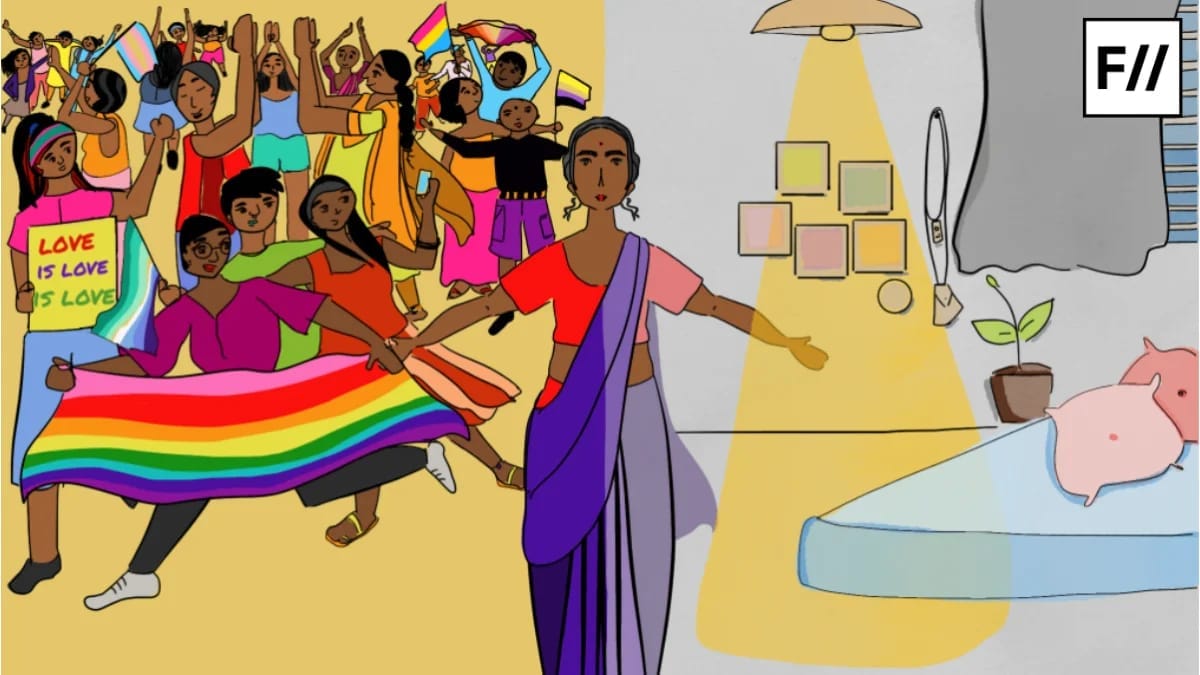Recently, Terry Crews tweeted that he believed it is necessary for children to have a father and a mother in the household, or they might grow up at a disadvantage. In reply to one tweet that said ‘a child will not starve with only one gender loving them’, he stated that that child would be ‘severely malnourished’. Despite the fact that Crews apologised for his poor wording, it still stands that his tweets echo some dangerously homophobic stances used to block same-sex couples from having children. It seems that even today, there are several misconceptions about a household with two mothers or two fathers. Drawing from the experiences of people who are personally affected by this issue, let’s break down these harmful myths about same-sex parenting.
Myth 1: People with parents of the one gender are disadvantaged in life
Kira Bradley-Golt, who was raised by two mothers, often receives ignorant questions about her upbringing. What is even worse is the occasional rude comment on how she needs a father in her life.
“A lot of assumptions are based around the fact that children of same-sex couples are ‘missing out’ on not having the opposite gender parent present. A lot of people think I missed out on not having a father,” Kira explains.
Amber, who also has two mothers, says that people often assume that one of them is her step-mum and that a father must still be involved somewhere. “When I insist that I don’t have any kind of father figure, they’ll assume that’s some sort of deficit in my life, that I must feel as if I’m missing something,” she says.
Fighting back against this myth, Amber adds, “I had two loving parents all my life, and the fact that neither of them is a man has never made any sort of difference to me, has never made me feel like I was lacking anything.”
Despite what people think, children of same-sex couples can grow up to be healthy, happy and functional human beings. Out of 79 studies about same-sex parenting, The Guardian found that 95% of the research data suggests that there is no difference between same-sex parents and heterosexual parents. Children of same-sex parents turn out just as psychologically healthy, capable and successful as their peers. Not having a mother or a father does not render a child inherently inferior because love is not gendered. It is more important for a child to be raised by loving parental figures than to have a heterosexual couple bring them up.
Not having a mother or a father does not render a child inherently inferior because love is not gendered.
Kira and Amber are just one of the many people raised by a same-sex couple who has grown into a mature, smart and successful adult. There is no job that requires a parent of a certain gender to perform, only parents of a certain level of commitment and dedication to their family.
Myth 2: Same-sex parents raise their children to be part of the LGBTQIA+ community
This myth is particularly illogical. There are many LGBTQIA+ children who were raised by straight parents who later realised that they were queer — having cisgendered, heterosexual parents did not change their non-conforming sexual or gender identities, so why should the reverse apply? The ‘LGBTQIA+ lifestyle’ cannot, objectively, be forced upon children of same-sex couples; one’s sexual or gender identity is not something that can be defined by external influences. It’s an inherent trait in oneself, a core part of one’s identity. Leo Sheng, who grew up with two mothers, talks about this harmful myth that same-sex parents pre-define the gender or sexual identity of their children. He tells me, “People often assume I’m trans because I have two moms – that they’re the reason. It’s a bit of a combination of the general argument against same-gender parents (lacking a binary opposite, gender-specific influence), and being convinced that I would ‘turn out’ like this because of them.”
In fact, children with same-sex parents exist in the same heteronormative society where being part of the LGBTQIA+ community is still difficult. Many LGBTQIA+ children with same-sex parents still have to go through the same process of coming out as their peers with heterosexual parents do.
Also read: 5 Most Annoyingly Intrusive Questions I Get Asked As A Mother
Leo Sheng, for example, did not find it any easier to come out to his parents as trans just because they were also part of the LGBTQIA+ community. “Some assume that because I have two moms, coming out was a breeze, that they understood immediately. While they both supported me and made me feel loved, my initial coming out was really difficult,” Leo Sheng says. When he first came out as trans, the discussion about hormones and surgery became too overwhelming for his family, and he had to “go back in”. He came out again a year later and eventually, his parents understood his need to transition.
Myth 3: Biological parents are better than adoptive ones
This is a myth that all parents who adopt have to deal with. However, because same-sex parents inevitably cannot both be biologically related to their child (for now), it affects them disproportionately. Many people assume that it is better for a child to live with their biological parents. Yet, what children actually need is a safe space to grow up in, which benefits them a lot more than a mere blood relation to their parents.
Amber, who was an in-vitro fertilisation baby and has one biological mother and another adoptive one, does not value either parent more or less because of who she is
“People will also often ask which one is my ‘real’ parent, assuming that whichever mom is biologically related to me is somehow more valid as a parent, which is entirely untrue.”
In fact, propagating this myth hurts not only the adoptive parents who raise their children as if they are biologically related, it also causes children to doubt their place in the household. Growing up with two loving parents and then having society tell you that your adoptive parent is not valid is unfair and confusing for the child. This is especially true if children already have to deal with being discriminated against for having same-sex parents.
Myth 4: Same-sex parents cannot raise happy and healthy children
Same-sex parents are still unable to get married in many countries. They are still denied the same rights as heterosexual parents; adoption rights are complicated, co-owning a house is difficult, and being able to be open about their sexuality is still an issue. Their children are still discriminated against for having parents that go against gender norms. Because of this, many people assume that same-sex parents will never be able to raise happy and fulfilled children.
This is a myth because it is certainly possible for same-sex parents to provide a stable and healthy home for a child. The only problem is with how the public reacts to them. If everyone became more open-minded, these family units would be just as happy as traditional ones. Yaiza Canopoli, who plans to raise a family with her girlfriend in the future, does not believe that same-sex parents will not be able to give their children everything they need to succeed in life. According to her,“Children face a lot of difficulties in life, and the gender of their parents will not necessarily be the biggest one. Parents cannot shield their children from everything, but what they can do is make sure that they grow up in a loving home, regardless of how it is perceived on the outside.”
Scientific research from the 1970s to now has made it increasingly clear that it is ‘family processes’ such as the quality of parenting and the psychosocial well-being of parents that determine a child’s chances of being a happy and successful human being rather than arbitrary factors such as the number, gender, sexuality, and cohabitation status of parents.
Also read: 8 Things To Do In Order To Raise Feminist Children
In the end, myths surrounding same-sex parenting all come down to societies’ notions of the gender binary. Leo Sheng puts it in a particularly eloquent way: “I think that a lot of the myths are rooted in misogyny and patriarchal traditions…I don’t know if it’s possible to completely strip our current notions of gender and patriarchal systems in my lifetime, but I think one way to combat these myths is to understand that the binaries we’ve created are just that – human-made.”
References
Featured Image Source: The Advocate
About the author(s)
Beverly Devakishen is a final year student at the University of East Anglia studying Literature and History. She is interested in Asian history, as well as issues around gender and sexuality. She is deputy editor for The Queer Review and has done journalism internships at newspapers such as The Guardian.




